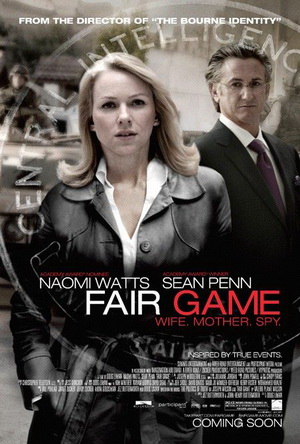
It’s hard to know exactly what to make of Doug Liman’s Fair Game, a dramatic retelling of the 2003 Valerie Plame scandal. If you’re familiar with the story, there’s a good chance you already have an opinion about it. Left wingers will revel in the Bush-era injustice done to Plame, while those on the right will see it as anti-war propaganda that was blown way out of proportion. Had Fair Game been released 5 years ago, it could’ve been a bombshell; arriving now, it feels like something of an afterthought.
The film does have the advantage of wielding two actors capable of brilliantly powerful performances: Naomi Watts and Sean Penn. Last seen together in the wrenching 21 Grams, Fair Game has them playing in a more subdued kind of drama as Plame and her husband Joe Wilson. It’s possible, and more likely probable, that these actors elevate this film above being a mere political-conspiracy sermon (which, to be honest, it still sort of is). You can tell that they care about the material, especially Penn, and so that makes it much more watchable.
There is plenty of finely detailed plot leading up to the crucial moment in the film, which is when Wilson decides to pen an op-ed article describing how the Bush Administration is deliberately ignoring evidence that shows Iraq was not obtaining nuclear materials from Niger, which Wilson discovered on his trip there. After the article is published, the Office of the Vice President, led by an gluttonously embellished Karl Rove and delightfully slimy Scooter Libby (David Andrews), strike back by leaking Valerie Plame’s CIA status to the media, compromising her overseas missions and effectively ending her career. The couple are painted as subversives, and Wilson goes on a media warpath to clear their names while Plame engages in a quieter fight of passive resistance, not sure how to fight back amongst her crumbing marriage and forcefully aborted career.
Somewhere inside of all this there’s a pretty good family drama, but Liman doesn’t seem to know how to extract it. Despite the fact that the last half of the film turns on the idea of Plame losing her marriage, it never seems like all that much of a relationship to begin with. Plame and Wilson always seem more professional than passionate; there is never a real moment of tenderness to make us believe in this marriage, and so we have trouble caring about it when it falters.

This fault lies with the direction and screenwriting, since Watts and Penn both give it all they have, and believe me, they can give it a lot. Of the two, Penn’s performance here becomes more interesting if only because his character seems to confused over his own motivations. He plays Wilson as a man who thinks he’s been emasculated not just by his wife’s power, but also by his own falling out of prominence on the political stage. He desperately wants to fight, to prove he is still valuable and important, even if that means he’s creating his own fight and proving these things by defending his wife. You can tell he cares for Wilson (as much as Liman allows him to), but he is also somewhat intimidated by her job. Who wouldn’t be?
If the film has a strength besides its performances, it is its ability to recreate the feelings of tension and uncertainty that surrounded those days leading up to the invasion of Iraq. At this point in time we have all made up our minds about the war, but regardless of our thoughts now it is chilling to see recycled news clips of elevated terror levels, scientists explaining uranium enrichment, and Bush and company employing the ever convenient “smoking gun, mushroom cloud” line. We remember how much we were caught up in it, how everyone was caught up in it, and how only a precious few people had the nerve to speak up and say that something might be wrong.
Fair Game wants to have that nerve, it wants to be that voice of dissent and exposure of a war that many of us still believe was criminal. But its delivery of that message is flawed, and by trying to be too political it loses some of the dramatic edge that could’ve created a story that had the power to move us and stir up those feelings of rage and passion that it so desperately wants to. It’s not a bad movie by any means, but its aims are so high that it cannot help but miss some of its marks, and the marks it misses are the important ones. Valerie Plame showed immense strength through her struggle; it’s a real shame that Fair Game can’t match that strength to be the movie she deserved.
Interesting but never fully engaging, Fair Game isn’t half the drama that it wants to be: B-

This is a good review, except that the reviewer doesn’t know how to spell “its.” The word “it’s” means “it is.” The word “its” is the appropriate form in this case, and he never uses it correctly.
Using incorrect grammar detracts from the strength of the review.
Should be fixed. Thanks